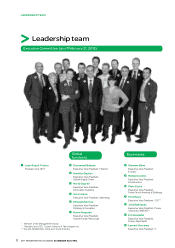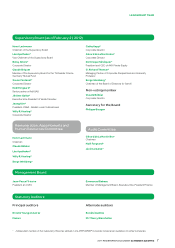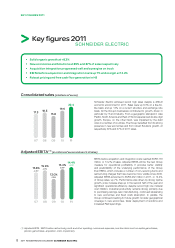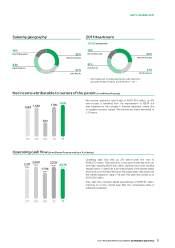APC 2011 Annual Report Download - page 18
Download and view the complete annual report
Please find page 18 of the 2011 APC annual report below. You can navigate through the pages in the report by either clicking on the pages listed below, or by using the keyword search tool below to find specific information within the annual report.
16 2011 REGISTRATION DOCUMENT SCHNEIDER ELECTRIC
1GLOBAL SPECIALIST IN ENERGY MANAGEMENT
DESCRIPTION OFTHEGROUP, ANDITSSTRATEGY, MARKETS ANDBUSINESSES
>
1. Global specialist in energy
management
Schneider Electric offers integrated products, systems, services, software and solutions in order to make energy safe,
reliable, effi cient, productive and green.
As a global specialist in energy management, with operations in over 100countries, the Group enjoys leadership
positions in Utilities and Infrastructure, Machine Industry and Manufacturers, Non-residential Buildings, Data Centres
and Networks, and Residential..
1.1 Effective management of energy resources, a global challenge
With economic, industrial and urban growth and the increase in the
world’s population, the need for energy is rising exponentially, along
with CO2 emissions.
Today, out of the world’s 7billions inhabitants, only 2billions have
access to adequate energy infrastructure and 2billions will attain
middle class status in around ten years, while 1.3billion people –
300million homes – still have no access to electricity. In addition,
the planet could have 2 billions additional inhabitants by 2030.
The increase in the global demand for energy seems set to carry
onrising.
At the same time, renewable energy sources are still insuffi cient and
the energy mix is unlikely to change much over the next 25years:
unless radical changes are made much faster than expected,
two- thirds of energy will continue to be produced from fossil fuels.
By 2050, the energy equation will therefore be: a doubling of
worldwide energy demand, and at the same time, a need to
halve CO2 emissions at the global level in order to combat climate
change. Under these conditions, economic development requires
more effective management of our resources and especially energy.
This is the business of Schneider Electric.
1.2 Towards smart energy management
The electricity grid is becoming smarter, and users need to be
connected simply and safely.
From mobile telephones to the internet to home automation,
technology is constantly making communication easier and faster.
This trend towards connectivity is growing throughout the world.
But no matter how technical products or solutions may be, users
want them to be easy to install, use and maintain. They want to
have access to reliable and safe energy that keeps their installations,
infrastructure and equipment operating at an optimal level.
A new, more “intelligent” electricity grid is emerging: the smart grid.
The traditional grid, which was simple and linear, with centralised
energy output and passive consumers is now changing into a more
complex, interconnected and active model.
With renewable energies each consumer can produce his or her
own energy, but the various and irregular sources now have to be
connected to the central grid.
Demand response makes energy visible and offers everyone the
chance to affect their own consumption.
Electric vehicles are revolutionising the perception of mobility, both
in terms of access to energy, and its use and storage.
Real-time grid management allows consumption levels to be
anticipated and supply to be adapted accordingly.
To meet regulatory, environmental and profi tability requirements,
energy must be safe, reliable, effi cient, productive and green.
Thiswill require integration: an entire system, not just the individual
components have to be taken into account. The era of intelligent
energy management has dawned, and Schneider Electric has the
vision, products and services and ambition necessary to play a
major role in this energy revolution.
























